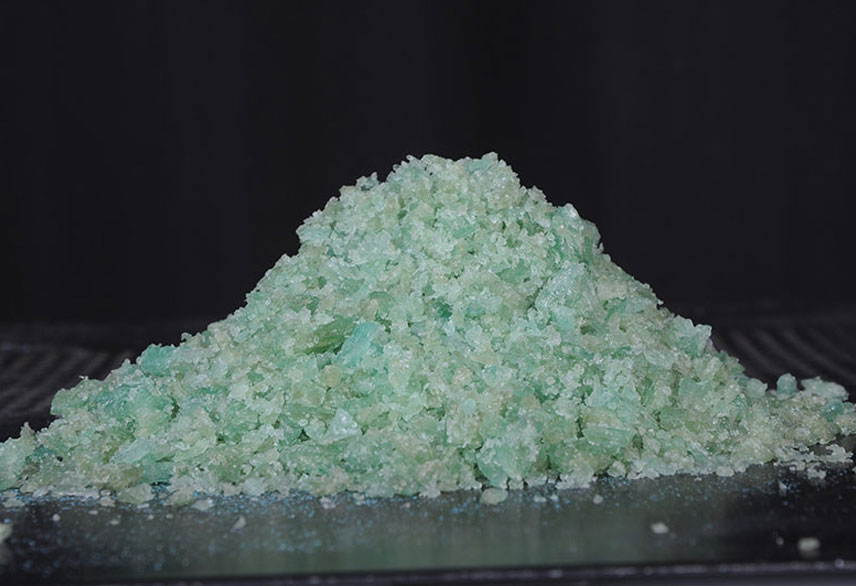Ferrous Sulphate, also known as iron(II) sulfate or iron(II) sulphate, is a chemical compound with the formula FeSO4. It is a water-soluble salt that contains iron in its ferrous state, which means it has a positive 2 charge. This compound is commonly encountered in both its anhydrous form (FeSO4) and as the hydrated form with varying degrees of water molecules incorporated (FeSO4·xH2O).
Chemical Composition and Structure
The chemical composition of Ferrous Sulphate is relatively straightforward. It consists of one iron (Fe) atom, one sulfur (S) atom, and four oxygen (O) atoms, arranged in a specific configuration. The iron atom forms a central core, surrounded by four oxygen atoms in a tetrahedral arrangement. The sulfur atom is bonded to one of the oxygen atoms, completing the molecular structure.
In its hydrated form, Ferrous Sulphate incorporates water molecules (H2O) into its crystalline structure. The number of water molecules can vary, giving rise to different hydrates, such as Ferrous Sulphate Heptahydrate (FeSO4·7H2O) and Ferrous Sulphate Monohydrate (FeSO4·H2O). These hydrates have unique properties and applications.
Understanding the chemical composition and structure of Ferrous Sulphate is crucial for comprehending its various applications across industries, from medicine to agriculture and beyond. This knowledge forms the foundation for harnessing the diverse properties and benefits of this versatile compound.
Physical Properties of Ferrous Sulphate
Appearance and Texture
Ferrous Sulphate exhibits distinct physical characteristics that make it easily recognizable. In its anhydrous form, it appears as a pale green to bluish-green crystalline powder. The individual crystals are typically fine and granular, resembling coarse sand. When in its hydrated forms, such as Ferrous Sulphate Heptahydrate (FeSO4·7H2O) or Ferrous Sulphate Monohydrate (FeSO4·H2O), it adopts a more crystalline structure with a light green to bluish-green color.
In terms of texture, anhydrous Ferrous Sulphate feels slightly gritty to the touch due to the fine granules. In its hydrated forms, it may exhibit a more compact and crystalline texture, often forming clusters or aggregates of smaller crystals.
Solubility and pH Levels
Ferrous Sulphate is highly soluble in water, which is a significant aspect of its utility. When introduced to water, it readily dissociates into its constituent ions, releasing iron (Fe2+) and sulfate (SO4^2-) ions into the solution. This high solubility allows for easy incorporation into various applications, particularly in industries like agriculture, where it can be used as a soil amendment or in medicine for iron supplementation.
Regarding pH levels, Ferrous Sulphate exerts an acidic influence on solutions due to the presence of sulfate ions. When dissolved in water, it lowers the pH, making the solution more acidic. This property can be important in applications where pH adjustments are necessary, such as in water treatment processes.
Understanding these physical properties of Ferrous Sulphate is crucial for its effective use across a range of industries, ensuring that its unique characteristics are harnessed to achieve specific desired outcomes.
Industrial and Commercial Uses
Water Treatment and Purification
Ferrous Sulphate plays a vital role in water treatment and purification processes. Its properties make it an effective coagulant, aiding in the removal of impurities and contaminants from water sources. When added to water, Ferrous Sulphate reacts with substances like algae, organic matter, and certain metal ions, causing them to clump together and settle to the bottom. This facilitates their removal through sedimentation or filtration, resulting in clearer and safer water.
Additionally, Ferrous Sulphate helps in the control of odours and the reduction of sulfide in water, improving its overall quality. Its use is prevalent in municipal water treatment plants, wastewater treatment facilities, and in various industrial processes that require high-quality water.
Dyeing and Tanning Processes
In the textile and leather industries, Ferrous Sulphate finds significant application in dyeing and tanning processes. As a mordant, it helps fix dyes to fabrics or hides, ensuring that the color adheres firmly and resists fading or bleeding. This is particularly crucial in achieving vibrant and long-lasting colours in textiles.
In tanning, Ferrous Sulphate aids in the preservation and transformation of animal hides into leather. It acts as a reducing agent, facilitating the conversion of chromium salts into a form that is more effective in the tanning process. This results in durable and supple leather products.
By virtue of its role as a mordant and a reducing agent, Ferrous Sulphate plays a pivotal role in enhancing the quality and longevity of textiles and leather goods, making it an indispensable component in these industries.
Vinipul Inorganics India Pvt. Ltd: A Trusted Supplier for Ferrous Sulphate
Vinipul Inorganics India Pvt. Ltd. stands as a distinguished leader in the production, supply, and distribution of Ferrous Sulphate. With an unwavering commitment to quality and a global presence, the company has earned a reputation for excellence in the industry. Our extensive expertise and reliability have made us a trusted partner across various sectors, including agriculture, chemical manufacturing, glass production, and cosmetics. As a cornerstone in the Ferrous Sulphate supply chain, Vinipul Inorganics plays an instrumental role in advancing industries on a global scale. Our dedication to quality and innovation paves the way for a promising future in chemical manufacturing, solidifying our position as a trailblazer in the field. Contact Us Today!




